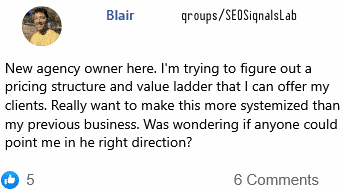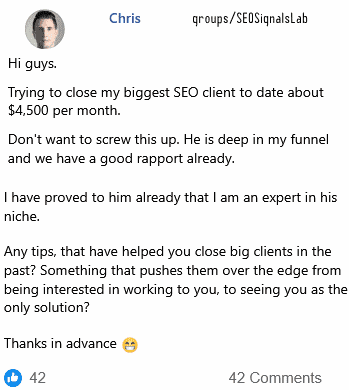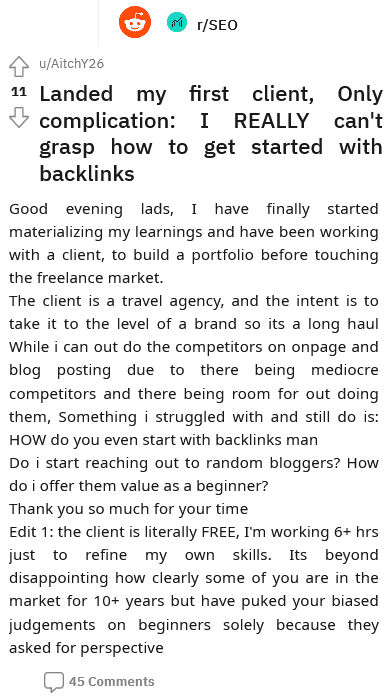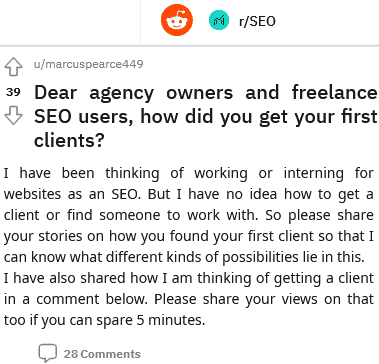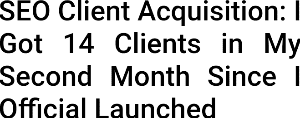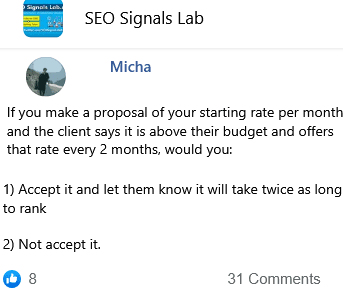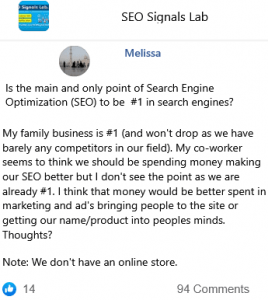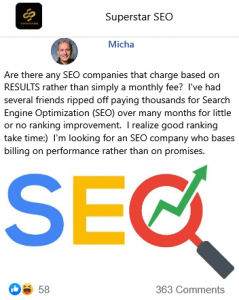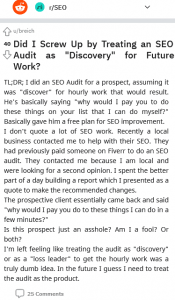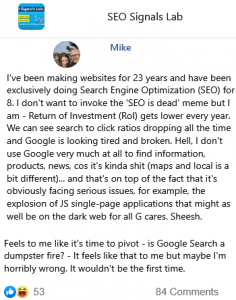New agency owner here. I'm trying to figure out a pricing structure and value ladder that I can offer my clients. Really want to make this more systemized than my previous business. Was wondering if anyone could point me in he right direction?
5 👍🏽5
6 💬🗨
📰👈
Our agency approaches it a bit differently. We don't offer a menu of services like a lot of places do. We are also a Digital Marketing Agency – rather than strictly an SEO Agency.
What we do is perform a complete analysis and study of the business – from Search Engine Optimization (SEO) to what they do and how they work to understanding what they want from it, their basic budget considerations, and so on. Typically this is a 2 or 4 week process depending upon the size of the business and we're contracted for that 2 or 4 week period.
Then we all take our lists of things to fix, things to improve, things to work on, keyword research, coverage reports (if they exist) and all that – and we get together and work up a strategy.
That strategy is tiered to at least two levels: The "Must Do To Succeed" Stuff, and The "Stuff We Should Do To Get There More Quickly and Have the Best Growth and ROI". Sometimes there is also a third level in there – something in between or something that would put us way out of their "working budget" thoughts – but that we might want to present because, while it costs more, it greatly increases the chances, speed, or volume of the ROI with us. Basically that one is the, "You don't need to do this, and it's going to cost you a lot, but if you do it, there's a very strong chance that it could turn into big bucks for you very quickly."
So this gives the client a choice – start with the minimum and maybe not reach goals as quickly or get as high as we might over this first year – but it will be enough to justify our existence and put some money in their pocket – or go with the "recommended" plan that will maximize the returns, do it in a reasonable timeframe, and minimize the risk of failure at any given goal or objective.
We don't even necessarily outline exactly what we are going to do to reach the goals. Sure, if there's a content strategy involved, then we'll say that we're planning on X posts per month or something. But we might sacrifice a post one month to generate a new page or section on the site that we realize mid-game would probably pay off better. And we don't say "X number of Links per month" or "X number of hours spent per month getting links" – we just allocate an amount of time each month to link generation that should get us the quality and quantity we need to move the needle a bit. The client doesn't need to be bothered with the specifics unless we're making a risky move – which we don't typically do.
Our goals are set to be things that actually provide real value to the client, too. We don't promise X traffic or X keywords ranking. Those numbers can help us see if we're on track, but they aren't goals. Goals are things like sales or leads that the client can turn into sales. We try to shoot for a break even point of around 4 months. This means that the client is generating at least as much in new sales each month as they are paying us to get them. They aren't necessarily making money yet, but we're not costing them out of pocket anymore, either. By month 6 or 7 we like to be at around 20% – meaning for every dollar they give us, they're making 5 dollars and get to keep at least four of it for themselves. Ideally we like to land at around 10-14% but that can sometimes be tough to reach in six months no matter what budget you throw at it.
Now. by doing it this way, we might find that no matter how you slice it – doing the minimum needed to generate any revenue will cost more than they are willing to budget or that it's just a crazy number where we just couldn't really ever hope to break even. In those cases, we tell them that there really isn't much we can do (at a reasonable price) for them, but since they hired us for the month, several of our team members will hop on a meeting and give them some things they can do themselves if they want, answer any questions they may have, and generally help them be in a somewhat better place than when we started, even though we're not really going to do anything. Sometimes I'll go in and make a few tech tweaks for them and things like that too.
If they DO go for it, then all is good. For it to work though – you need a team that tracks and measures everything. You need a team that is nimble, too. If we spot something that isn't working as well as we'd hope, we either need to figure something else that will accomplish the same thing or figure a way to pull time from one thing to throw at making this failing strategy start to pay off. The team has to be able to see where things are failing and know what to do with them – and deal with it before the failure actually happens. And, of course, the team needs to always have their eye on the prize – making that client money. We can rank them, we can send them traffic all day long, but if it's not making them any money, we're going to be looking for a new client the second that contract is up for renewal.
So… unfortunately, this isn't a "more systemized" answer but it is an answer that creates the situation we're in. In a field of roughly 20-24 clients in businesses no larger than around $80Million a year in sales but definitely large enough to sink a decent budget into marketing: We lose one or two clients every year due to them just not following up for whatever reason. We lose 3 or 4 clients every year because they outgrew us – we simply don't have the number of people needed to service them properly without neglecting other clients. So… we help them pick out and grow into a new, larger agency that can continue what we started. And the rest stay on with us.
In my experience, SEO "systems" just don't work. The things that work great for one site will be useless for another. This isn't even across niches, but locations, too. In a city, I need to spend a lot more on this, this and this while in a rural area with lower competition, I need to do things to go wider rather than deeper. You might be able to "sell" the system, but client satisfaction will vary unless you determine what they actually need to succeed and then figure out how to deliver it and what that is going to cost to do so.
💟👍🏽18
Wow. This is an incredible and in-depth response. It sounds like you have been doing this for a decent amount of time and are an expert in the area. Thanks!
Truslow 🎓
Hope it helps. Seriously. SEO is as much art as it is science and as such, if you're trying to mass produce results with a checklist, it's going to be "Dogs Playing Poker" results – not "Mona Lisa" or "The Starry Night" type results.
📰👈
Tripper
I'll add two things.
Truslow is my heroes. You give away more info and help on allot any list I read then anyone.
1. A lot of businesses have more money than you think. I'm not saying it's just about making money. However, I recently fell in with a company out of Africa. Offices in 6 different countries.
I found two different things. 1. Obviously in some countries there is not as much Money to be invested.
2. What I was surprised about was the companies that had the money recognized USA priced as being par for the course (give or take; but not much ).
💟👍🏽2
Yes. When they don't want to make a big spend it's often less about "having the money" and more about "wanting to risk the money." In this cases you need to explain how you evaluate and minimize their financial risk – you need to explain how much of what you're going for is "near certain" and what parts of it are "we hope we can reach this level, though."
In other cases, the clients just don't have the concept framed properly in their mind. "$3000 a month? Every month? I can't afford to fork out that kind of money!" In these cases, they need to understand that they won't be coming up with $3000 a month, every month. They'll need to do that for 3-4 months. By the 4th month, we'll have increased their revenue enough so they don't have to "come up" with money anymore – they can pay us from what they made on the web site. By month 7-8 the web site will be making enough revenue from this that they can pay us, pay back some of that initial investment, and still have healthy margins on their sales.
Tripper » Truslow
Makes great sense. And I wasn't trying to be crazy lol. The answered you have been giving in here are more detailed and helpful then any other group I'm in by far.
I think the one thing hard to understand as a business person/owner/consultant is your cost. I mean it can be easy but it's important at a simpler level to be able to measure the cost of tools. SEMrush, screaming frog, Ahrefs or whatever. Even though $150 an hour might be middle of the raid here it's important to me to be able to explain where that is coming from.
What I not so eloquently stated is the price of solid SEO (in my experience) doesn't really fluctuate as much as people think. I recently. Obviously most princess are custom and most businesses don't have prices listed. However, in doing market research in 6 different African countries recently, I was surprised to see the princess I did find were it that much cheaper then the states or uk.
Why do SEO Pricing Rates Vary? a Freelance or VA versus an Agency versus a Company
How to Inform a Client for Raising your Pricing?
How Much Money Or Budget Did You Ever Spend For SEO a Month?
SEO Pricing a Month for a Client
